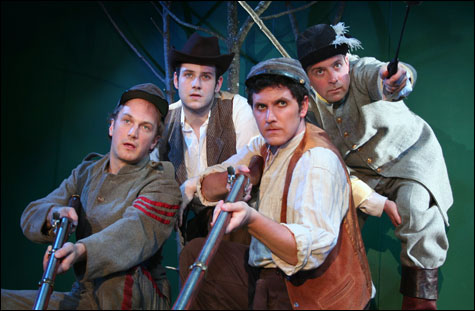
THE KENTUCKY CYCLE: This bluegrass Henriad has you from hello.
|
Whitewash has floated like a soap scum on the bloodbath of America’s past as told in the history books. Robert Schenkkan’s
THE KENTUCKY CYCLE
blows the skim off the water, offering 200 years of Appalachian “progress” — from lawlessness to vengefulness to Norma Rae. This seven-hour, nine-play saga, which begins in 1775 on a precious piece of Eastern Kentucky ground that will be strip-mined before all is done, premiered in Seattle in 1991 and in 1992 became the first stage work to win the Pulitzer Prize before being produced in New York — which, of course, propelled it to Broadway, where it ran for a month. The Kentucky Cycle may be just too expensive and unwieldy for commercial production, requiring as it does two three-and-a-half-hour sit-downs and 20-some actors deployed in 120 speaking roles. (It probably didn’t help that the cycle came to fruition at the same time as Angels in America.) Perhaps the only sort of theater that could, with any thought toward fiscal prudence, take a shot at Schenkkan’s epic would be a non-Equity troupe whose leader is insane enough to try. Enter David J. Miller, honcho of two-time Elliot Norton Award–winning Zeitgeist Stage Company, which teams with Way Theatre Artists to present an area premiere of The Kentucky Cycle (at the Boston Center for the Arts through November 17) that is a sweeping, small-scale triumph.
A bluegrass Henriad or Greek tragedy whose bloodletting leaks across seven generations of three interconnected clans, The Kentucky Cycle has you from hello. In the first short play, “Masters of the Trade,” wily indentured Irishman Michael Rowen manages to turn a vigilante quest into a business opportunity, making a land deal with the very gun-toting Cherokees who just wiped out his settlement. In the next installment, “The Courtship of Morning Star,” Rowen abducts, rapes, and maims the Cherokee woman who will become his reluctant mate. And before intermission of Part One, we’ve had a patricide — with most of the white men’s violence stemming from lust for the land and the independence it provides. It’s like the Oresteia as rewritten not by Eugene O’Neill (who did that in Mourning Becomes Electra) but by James Tyrone, the property-covetous actor patriarch of Long Day’s Journey into Night.
Part One, which follows the Rowen, Talbert, and slave-descended Biggs clans through the Civil War (less a patriotic undertaking than an opportunity to settle old scores), is more primal than Part Two, which runs from 1890 to 1975 and concentrates on the war between ruthless mine owners and a union that, begun in heroic defiance, comes to want its place at the trough. Mother Jones puts in an obligatory appearance, and the cycle offers, in the 1920-set “Fire in the Hole,” its own union matriarch, a latter-day Rowen who has seen the “hillbilly” paradise of her youth become a hell of coal dust and human want.
Best viewed in its entirety (which can be done on Saturday or Sunday, with a dinner break), The Kentucky Cycle clarifies — sometimes with scathing irony — how one thing piles on another, adding up to both regional mythology and dehumanization. “Some men rob you with a six-gun/Some with a fountain pen,” sang Woody Guthrie, and both brands of theft are on view here, with the latter, depicted amid a vibrant mix of nature worship and whoppers in “Tall Tales,” at least as piquant as the former.
Schenkkan’s cycle offers, along with its large doses of history and melodrama, flights of poetry and a keen sense of place. What Zeitgeist adds, in this vigorous chamber staging, is human scale. The saga unfolds in the tiny BCA Black Box on and between two small stages, and for all the opportunity, there is little hamboning among Miller’s 23 non-Equity players, who also provide the music, from the sweet strains of “Amazing Grace” to the union songs of the ’20s. A house band made up of cast members even provides a pre-show concert of regional tunes bound to get your toes tapping before our bloodstained history steps on them.
As he proved with Stuff Happens, the David Hare drama depicting the run-up to the Iraq War (which last year seemed an accomplishment but compared to this looks like a Beckett play), Miller is adept at deploying his talented non-professionals — who here include two refreshingly natural kids, Matthew Scott Robinson and Jacob Rosenbaum. The actors bounce among roles without, for the most part, falling into delineating caricature. Even the worst of the characters is pitiable. Callous dynasty maker Michael Rowen is imbued by Michael Steven Costello with a demonic energy that’s irresistible. Christine Power brings a lyrical fierceness to reluctant union matriarch Mary Anne Rowen. Peter Brown is effective as both a fire-and-brimstone preacher whose Bible is a retribution manual and a 20th-century United Mine Workers leader squeezed into a compromise that proves both fatal and personal. There are robust turns, too, by Bill Bruce, Amanda Good Hennessey, and Jonathan Orsini. And the whole cast is to be admired for getting its collective arms around this Herculean effort and remembering from moment to moment just where in the course of its all-too-human events they are.